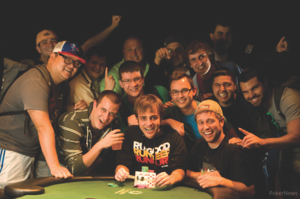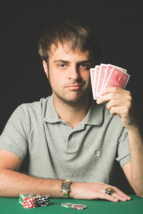
Bryan Campanello wins big at World Series of Poker.
Southlake's Poker Pro Bryan Campanello is the King of Cards
By Sean Chaffin
Thousands of players from aroundbrthe world flock to the World Series of Poker each summer to try their hands atbrpoker glory. This year's series featured 61 tournaments culminating in thebr$10,000 buy-in Main Event, the world championship of Texas Hold 'em, broadcast livebron ESPN. The series of tournaments leading up to the championship feature theirbrown massive fields and major payouts, each awarding the winner a coveted goldbrbracelet — the biggest trophy in poker. For 21-year-old Southlake native BryanbrCampanello, these events at the Rio Hotel and Casino in Las Vegas proved abrgreat gamble. The young cardsharp bested a field of 301 players to earn abrbracelet, as well as $178,052.With several other recent top-tournamentbrfinishes, Bryan might be one of the hottest young players in the game.
“Winning a bracelet was a dream come true,” he says. “It'sbrsomething that most pokers only get to think about, much less accomplish, in theirbrfirst summer in Las Vegas. I had a lot of friends on the rail who travel thebrWSOP Circuit with me. It was nice to have a support system out there and havebrthem pushing me.” Bryan won his bracelet playingbrRazz, an obscure game where players are dealt seven cards total (three down andbrfour up). Players bet as the cards are dealt, hoping for the lowest hand withbrA-2-3-4-5 being the best. With little experience in the game, Bryan took advantagebrof online information and tips to learn more about it. His research paid off.
Poker Life
The road to victory is never easy inbrthe WSOP. After feeling well the first two days, Bryan was exhausted by thebrthird day, which lasted until 4 a.m.
“Poker is a mentally straining game, and after three 12-plusbrhour days, you are really tired,” he says. “On days one and two though, I wasbrfresh and learning a lot about the game.”
When he was younger, Southlake's newfound poker star found hisbrinspiration to take up the game watching the WSOP on TV. By the time he was inbrthe seventh grade, Bryan asked his father, John, for a poker table to use forbrgames with friends.
“I playedbrwith them a few times but didn't grow up playing cards, so I really didn't havebrmuch interest,” John says of those early games. “Eventually, Bryan startedbrplaying online poker, and that's when he began to really get into the game. Hebris an avid reader and started reading all sorts of poker books, articles onbrvarious poker sites and blogs. Then during his winter break in 2011, he playedbrin a live tournament at a WSOP Circuit event at a Choctaw Casino in Oklahoma.” Thatbrfirst visit to the Choctaw proved to be more than auspicious: Bryan entered twobrtournaments, winning the first and placing runner-up in the second.
“Afterbrthat, I remember him calling my wife and me to tell us he was at the finalbrtable of a large online tournament,” John says. “He paid $24 to enter and wonbrthe event for about $24,000. My wife and I didn't know what to think of it atbrthat point, but we made him deposit the winnings into a savings account.”
More success followed over the next few years, including abrwin of $107,730 for a fourth-place finish at a WSOP Circuit event at the same ChoctawbrCasino in January of this year. Bryan added a win in a $365 buy-in circuitbrevent in Blackhawk, Colo., in March of this year for $21,223. Friends andbropponents describe Bryan as a relentlessbrplayer: Players often have a difficult time deciphering what kind of hand he isbrholding — a distinct advantage in a game based on skill and outwitting yourbropponents.
“Thebrother thing that makes him a good player is that he has a great memory,” notes John,brwho eventually began playing after his son took up the game. “He is a triviabrbuff and easily remembers movie lines and television quotes in great detail. Withbrpoker, he can remember hand histories and how certain players play variousbrhands. This skill provides a unique edge. I also think the skills he learnedbrfrom all the years he spent in debate help him as well. The trait he has thatbrreally is a difference-maker is that he doesn't get nervous. In fact, I havebrnever seen him nervous.”
Yet, itbrwas a comment about his behavior at the table that really sticks out in John's mind.brAt a recent tournament, a few fellow players offered some compliments about hisbrson, calling him a nice young man who is very respectful to other players andbrtournament staff.
“It was abrhuge compliment and made me feel very proud,” he says.
Southlake Card Shark
Growing up, Bryan lovedbrhis childhood in Southlake; he cherishes his hometown's close-knit sense ofbrcommunity. When they're all in town, Bryan and his high-school friends spendbrtime at Southlake Town Square catching a movie or grabbing a beer at The GingerbrMan. Away from the table, Bryan enjoys attending sporting events andbrplaying trivia games.
Much of hisbrcompetitive spirit was developed in high school,brcompeting for four years on the Carroll Dragon debate team. Travelling tobrevents across the country, Bryan honed his skills, which earned him abrscholarship to George Mason University in Washington, D.C., but he returnedbrhome after one year to focus on poker. The move allowed him to play at thebrWinStar Casino in Oklahoma and travel to more live tournaments, yet he stillbrhad time to continue his education. Bryan transferred to the University ofbrNorth Texas where he is 30 hours away from a degree in political science. Afterbrhis recent big win, he decided to take one semester off for a bit of travel andbrmore poker. His first stop is Florida,brthen Toronto to play poker online (online poker is now illegal in most of thebrU.S.); after that, it's off to London and Paris for a few tournaments. The lifebrof a poker champion can certainly have its rewards. With $380,000 in live-tournamentbrwinnings, Bryan can now afford to play the world's most prestigious events andbrhas a bankroll for more cash games. Despite all his success, friends and familybrsay he has remained grounded.
“Bryan is easygoing but anbrintense competitor,” John says. “He is well-rounded, well-traveled andbrwell-read. He is very bright, highly confident, and when he sets his mind tobrsomething, he usually exceeds at a high level. As with any parent, we only wantbrthe best for him, and we feel he has chosen a path that fits his personality andbrhis natural strengths. I wouldn't be surprised if he excels at poker for manybryears, then changes focus to business or politics.” Althoughbrpoker players are notorious for going broke — dealing with huge cashbrfluctuations is normal for many poker pros — Bryan has no big plans for hisbrwinnings other than for more poker. He has received plenty of support from hisbrfamily and plans to be smart with his money.
Reactions to Bryan's careerbron the poker circuit go one of two ways: Some people don't know much aboutbrpoker and might have notions of the game being a bit shady; others have a fairbrunderstanding of the game and are excited someone they know is succeeding at it.
“Most people don't knowbrit's more than a game of chance,” John says. “It's a game that requires greatbrskill, a tremendous amount of focus and very long, tedious hours. It's hardbrwork that isn't easy on the mind or body — you have to earn it. My wifebrand I realize Bryan has chosen a unique career path with poker, and we fullybrsupport his efforts. We're very proud of how he has handled his early successbrbecause he hasn't changed his focus.” And what's his currentbrfocus? Getting another big win, of course.
Sean Chaffin is a freelance writer in Rockwall, Texas. Hisbrnew book, RAISING THE STAKES: True Talesbrof Gambling, Wagering and Poker Faces, isbravailable as an eBook and in paperback at Amazon.com and BarnesandNoble.com. Hebris also editor of PokerTraditions.com, all about poker history, lore andbrpeople. If you have a story idea, email seanchaffin@sbcglobal.net. Followbrhim on Twitter @PokerTraditions.

